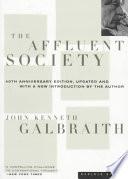“More die in the United States of too much food than of too little.”
Source: The Affluent Society (1958), Chapter 9, Section II, p. 103

The Affluent Society is a 1958 book by Harvard economist John Kenneth Galbraith. The book sought to clearly outline the manner in which the post–World War II United States was becoming wealthy in the private sector but remained poor in the public sector, lacking social and physical infrastructure, and perpetuating income disparities. The book sparked much public discussion at the time. It is also credited with popularizing the term "conventional wisdom". Many of the ideas presented were later expanded and refined in Galbraith's 1967 book, The New Industrial State.
“More die in the United States of too much food than of too little.”
Source: The Affluent Society (1958), Chapter 9, Section II, p. 103
“Simple minds, presumably, are the easiest to manage.”
Source: The Affluent Society (1958), Chapter 19, Section V, p. 218
“The enemy of the conventional wisdom is not ideas but the march of events.”
Source: The Affluent Society (1958), Chapter 2, Section IV, p. 21
“We do not manufacture wants for goods we do not produce.”
Source: The Affluent Society (1958), Chapter 9, Section VI, p. 113
“Private enterprise did not get us atomic energy.”
Source: The Affluent Society (1958), Chapter 25, Section III, p. 274
“One man's consumption becomes his neighbor's wish.”
Source: The Affluent Society (1958), Chapter 11, Section II, p. 125
“The greater the wealth the thicker will be the dirt.”
Source: The Affluent Society (1958), Chapter 18, Section II, p. 201